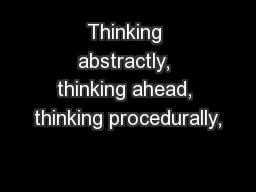PDF-(BOOS)-A Natural History of Human Thinking
Author : clementinequade | Published Date : 2022-09-01
A Wall Street Journal Favorite Read of the YearA Guardian Top Science Book of the YearToolmaking or culture language or religious belief ever since Darwin thinkers
Presentation Embed Code
Download Presentation
Download Presentation The PPT/PDF document "(BOOS)-A Natural History of Human Thinki..." is the property of its rightful owner. Permission is granted to download and print the materials on this website for personal, non-commercial use only, and to display it on your personal computer provided you do not modify the materials and that you retain all copyright notices contained in the materials. By downloading content from our website, you accept the terms of this agreement.
(BOOS)-A Natural History of Human Thinking: Transcript
Download Rules Of Document
"(BOOS)-A Natural History of Human Thinking"The content belongs to its owner. You may download and print it for personal use, without modification, and keep all copyright notices. By downloading, you agree to these terms.
Related Documents














